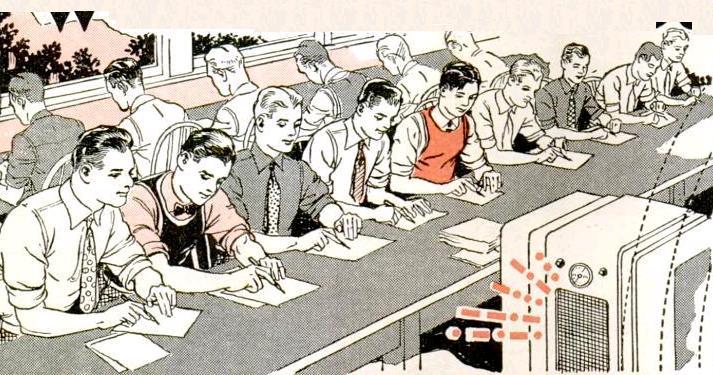 Amateur radio was off the air for the duration during World War II, but a lot of young men were interested in radio (not unlike the ones shown above in a previous post.) One of them had a really bad luck with timing, and received his ticket on December 6, 1941. He wrote the following letter, which appeared with a response 80 years ago this month in the October 1942 issue of Radio Craft.
Amateur radio was off the air for the duration during World War II, but a lot of young men were interested in radio (not unlike the ones shown above in a previous post.) One of them had a really bad luck with timing, and received his ticket on December 6, 1941. He wrote the following letter, which appeared with a response 80 years ago this month in the October 1942 issue of Radio Craft.
Dear Editor:
I feel that I have been cheated by the Japanese. or Germans, or the F.C.C. or someone. To explain this I will have to give you some of my past history.
I became interested in radio in the winter of 1939. I listened to amateurs on the short-wave end of my broadcast receiver. I also read radio books here and there for about a year. I got a telegraph set and learned to send up to about 12 w.p.m. on it. Then I got a key and buzzer. In May of 1941 I built a two -tube battery radio and had much trouble with it. I did not get it
to operate until July, 1941. Also in May I bought a license manual and radio amateur’s handbook, and rented a Teleplex instrument. It was two months before the Teleplex came, because of war needs. I studied in all of my spare time until September 22, 1941. That day I went 165 miles to Dallas and took my examination. I passed the code exam swell and I figure that I made about 85 on the questions.From then until December 6, 1941, the day when my licenses came through the mail, 1 built my station. I bought a Sky Buddy receiver and built a 25 -watt transmitter and a lot of other equipment. The only thing was that my antenna was broken by a high wind and replacement had to wait several days before I could get some more of the right kind of wire. On December 8, ‘I finished it and was ready to go on the air for the first time in my life. I was excited all over. I had been waiting for this hour for two years. Then I heard over the broadcast receiver about the F.C.C. closing all amateur stations. You can imagine how I felt.
Between December and February, 1942, I did not see a R & T. magazine. Without it, I could not read about what was happening in the radio field. Now I have forgotten nearly all I knew; I can’t send or receive over about 10 w.p.m.; I have forgotten most of the ham slang and everything. I am very unhappy. I suppose a lot of other amateurs are, too.
The government claims it uses the amateur bands for aviation and army use. 1 have a good communication receiver and I search all over the amateur bands and I can’t hear anything. Not even a telegraph signal. Why can’t the F.C.C. give us amateurs just a little space to operate. For instance, they could give us back the 160 – meter band and not let us use over 40 watts input and operate only during a certain period of the day.
There are a lot of amateurs in the army and on defense jobs, but there are still some left, like the ones under 17 and over 64, or the blind, deaf, or disabled, who love amateur radio.
I am 14 years old. It will be at least three years before I can go to war. If I could get on the air and Use radio equipment and become experienced enough, I would be able to operate a radio in the army. I have my licenses, but I have never been on the air, and have not studied radio since December of ’41.
Isn’t there some way for us to get on the air, at least to learn?
GILES EASLEY,
Calveat [Sic, Calvert],Texas.(Your letter stresses the nuisance of war but fails to consider the seriousness of war. If an amateur band were opened it would require constant vigilance to see whether advantage were not taken of this liberty by enemy agents, and the F.C.C. is too busy for that. Undoubtedly you can find other amateurs in your vicinity who may be able to meet with you for occasional code practice–even if its only on an audio oscillator. You should have more time now to study the technical phases of radio and to do some experimental work which will be valuable to you later on. Perhaps your local Civilian Defense group will find use for your services, either for constructing or operating emergency transceivers. -Editor)
It appears that the author did eventually get on the air. The 1952 call book lists a Giles M. Easley of Silver Spring, MD, being licensed as W3SSG. According to the Social Security Death Index, he died in Texas in 1985 at the age of 58. His gravestone indicates that he did, indeed serve in the U.S. Navy in World War 2.
